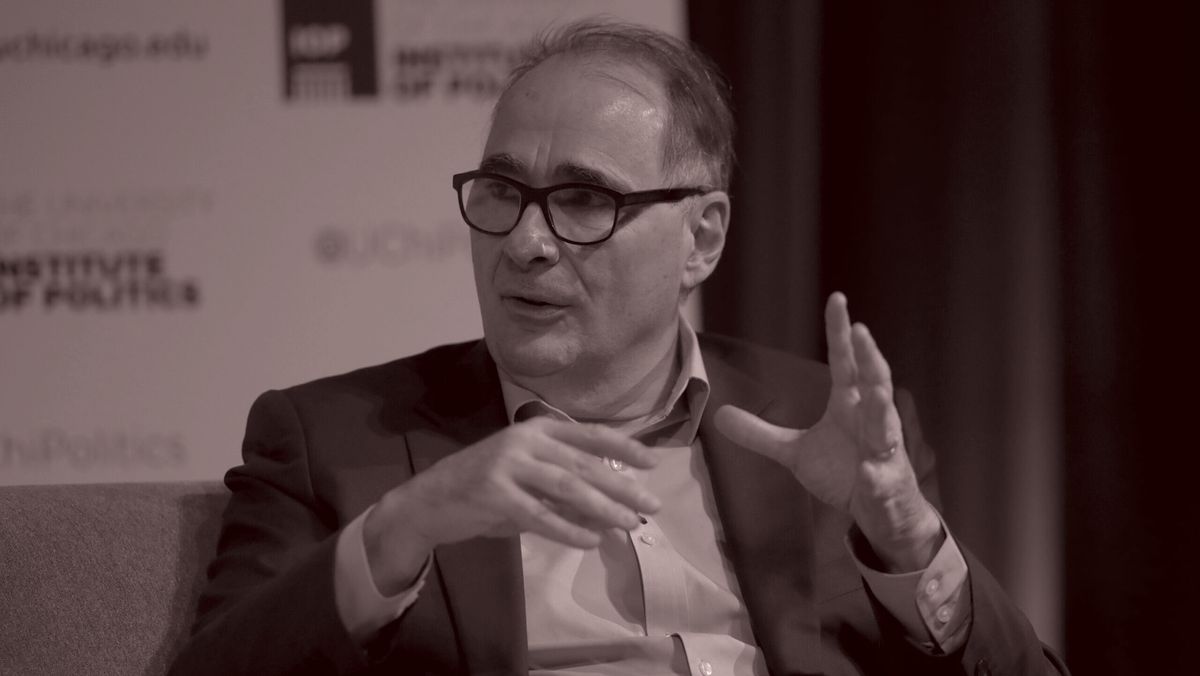Hello and welcome back to The Best & The Brightest. I’m Leigh
Ann Caldwell, exhausted from the late nights and long days of parties, brunches, and events surrounding the White House Correspondents’ Dinner, but also energized from seeing old friends—some of you multiple times over the past three days—and meeting lots of new people. I was also thrilled to spend some time with my Puck colleagues Julia, Peter, Abby, and Dylan; and, of course, Jon
Kelly, Sarah Personette, Ali Hattamer, and Alex Bigler, all the people who make Puck thrive.
We, no doubt, had two of the best tables in the jam-packed ballroom of the Washington Hilton, featuring BP’s JP Fielder and his wife, Kelly; Megan Van Etten, with PhRMA, and Todd Van Etten of The Herald Group; Paolo Zampolli, a special envoy for President
Trump; Jeff Nussbaum of BPI; Tim Walsh of KPMG and his husband, Jeff; Ben Cantrell of BlackRock; and Geraldine Byrne Nason, Ireland’s ambassador to the U.S., and her son Alex Nason.
Even with no comedic headliner and no President Trump—just a video montage of other recent presidents who have attended and spoken—the pomp and circumstance of the dinner was fun, and
it was hard not to feel inspired by the phenomenal journalism that was honored. W.H.C.A. president Eugene Daniels’ heartfelt speech about the importance of the free press felt like an important pep talk given the president’s hostile posture toward the media.
This weekend, I also heard a bit of an update on Austin Tice, the freelance journalist and Washington Post contributor who was captured in Syria more than 12 years ago. I’m told the Trump
administration has been extremely engaged in the effort to bring Austin home and quite communicative with his family. His mother, Debra Tice, attended last night’s dinner (where Austin was acknowledged) and is holding an event at the National Press Club later this week to give an update on her son’s status. I first met Debra when we sat at the same table at the W.H.C.D. three years ago, and she has been a fearless and constant advocate for her son. #BringAustinHome.
In
tonight’s edition of The Best & The Brightest, I’ve got a wide-ranging interview with David Axelrod, the former top Obama aide and political strategist, about the seismic shifts underway in Illinois, the implications for the Democratic Party, and much more.
|
|
|
Congress can help keep teens safe with app store parental approval.
3 of 4 parents agree that teens under 16 shouldn’t be able to download apps without their approval.
Federal legislation requiring app store parental approval and age verification for teens under 16 would put parents in charge of teen app downloads – and help them keep teens safe.
Learn more.
|
|
|
- The
G.O.P.’s big, beautiful headache: Congress is returning from a two-week recess and jumping straight into a critical phase of Trump’s “one, big beautiful bill” of tax and spending cuts. House and Senate committee staff and leadership have been chiseling away at the policy while their bosses were away, and the relevant House committees are scheduled to meet starting Tuesday to hammer out the details.
We could know soon what will be included and what will be cut: Medicaid benefits?
Biden-era tax incentives for renewable energy? Perhaps most importantly for blue states: Will they increase the cap on the state and local tax deduction (SALT), and by how much? To $20,000? Or more? No Senate Republicans represent SALT-impacted states, so raising the cap is primarily a fixation of Republican House members from New York and New Jersey, and a couple from California.
Other known unknowns: Will they actually cut $1.5 trillion in spending? (The president is calling for
cuts totaling only $1 trillion, while the Senate has mandated just a few billion.) And who will give Speaker Mike Johnson the biggest headache: The hardline budget hawks in the Freedom Caucus? The centrists who worry about cutting too deeply? The single-issue SALT defenders? The Senate?
Remarkably, I’m also told that some conservative groups are taking the chatter about a tax on millionaires very seriously, and that Trump’s
remark to Time that he “love[s] the concept” of taxing the wealthy did not alleviate any of those concerns—even though the president also said he didn’t want it to be used against him politically.
Most Republicans agree that it’s a political loser for them, since the one defining throughline of the party has been its opposition to tax increases.
Now, conservative business groups may need to start reaching out to members to keep them in line. (“Congress needs to get its fiscal house in order, but it must do so by tightening its own belt, not by forcing American taxpayers to tighten theirs,” Richard Stern of the Heritage Foundation told me. “Punishing those who provide for others and create jobs is a recipe for failure.”) As I reported a few weeks ago, the fact that Republicans are even talking about this is extraordinary, even if it will never happen.
|
|
|
A candid conversation with David Axelrod, the longtime Illinois resident and former Obama
strategist, about his state’s shifting politics, Pritzker for president, and the dire need for introspection from the Dems.
|
|
|
Illinois, the Democratic epicenter of the Midwest, is facing major political turnover this cycle: Governor
JB Pritzker is contemplating a presidential run. Senator Dick Durbin just confirmed he won’t seek reelection, the starting gun for a half-dozen much younger Democrats who were jockeying for position well before he made it official. Rep. Jan Schakowsky, also 80, is about to announce that she won’t run again for her suburban Chicago district. (She already faces a challenge from the 26-year-old influencer
Kat Abughazaleh.) And all eyes are on Rep. Danny Davis, 83, who, to the party’s frustration, seems intent on running again.
Illinois also happens to be the home state of top Obama strategist David Axelrod, the founder of the Institute of Politics at the University of Chicago, his alma mater. A few days ago, I called up Axelrod to discuss the political dynamics in the state, which not only
reflect the long-overdue generational shift Democrats have been clamoring for, but is also certain to inform how the party positions itself nationally heading into 2028.
As Axelrod told me, the spate of retirements are unlikely to change the balance of power in Washington. But the tenor of the Senate Democratic primary will be telling, especially since the winner is expected to glide to victory in the general. It will also stress test the party’s campaign tactics as it continues
to search for its post-’24 footing: attacking Trump versus focusing on cost issues; running to the left versus presenting as moderate; etcetera. Durbin’s exit may also leave Illinois with no U.S. senators from downstate—i.e., anywhere outside Chicagoland, especially rural Illinois—another potential concern for some Dems.
|
|
|
App store parental approval can help keep teens safe online.
Today,
teens can download any app – even ones parents don’t want them to. Federal legislation that puts parents in charge of app downloads could change that, helping keep teens safe.
That’s why Instagram supports federal legislation requiring app store parental approval and age verification for teens under 16.
Learn more.
|
|
|
Then, of course, there are the questions swirling around Pritzker, who is trying to turn Illinois into a
blue-state bulwark against the president’s policies. From what I hear, Pritzker is expected to run for a third term as governor, even though several Illinois Democrats I spoke with—including Axelrod—think he shouldn’t.
Axelrod and I also discussed the political future of Rahm Emanuel (a potential presidential candidate, himself); whether the party will retake the House in the midterms; and the more fundamental (and overlooked) existential questions that Democrats still
need to reckon with. The following has been edited for length and clarity.
|
Leigh Ann Caldwell: Is Gov.
Pritzker serving himself by being so… out there this early in a cycle?
David Axelrod: I think Democrats, and particularly activist Democrats, are hungry for people who will demonstrably fight back and stand up to Trump. Pritzker’s carved that out.
Do you think he’s positioning the party the right way to respond to Trump?
If you’re asking about right now, I think the challenge for the party
is that there’s so much going on that deserves to be resisted. But from a political standpoint, the thrust should be on the things Trump is doing that have an impact on people’s day-to-day lives, and particularly livelihoods and costs, because that is what continues to drive people’s concerns.
Of course, the rule of law is an essential value that we should care about, and there are implications for everyone. But all during the campaign, Leigh Ann, I said that if you’re talking about
democracy over the kitchen table or the dining room table, you probably don’t have to worry about the cost of the food on the table. And so those rules still apply here.
To that point, do you think Democrats are making a mistake by focusing so much on wrongly deported immigrant Kilmar Abrego Garcia, who was imprisoned in El Salvador with hundreds of other Venezuelans?
That’s an issue that deserves to be [resisted]. I mean, it’s a horrendous practice. It feels
like they’re trying to put this guy on trial on X, and from the podium at the White House, because they can’t prove it in the court of law. We have vast resources and outlets with which to communicate, but in some ways, you still have to decide what the story is you want to tell. You have to tell it again and again and again, because of the diffusion of all these outlets. People need to know, what is the essence of what’s driving you? What is your project every day? Is it resisting Trump at
every turn, or is it focusing on improving the lives of people trying to make it in this economy?
So I think that has to be fought for sure. I don’t fault [Senator Chris] Van Hollen for going down [to El Salvador]. I’m not sure camping out, as one of the members of Congress said they were going to do, serves a great purpose, but I think you have to decide what the main story is we’re trying to tell here, and how do we drive that story.
|
Regarding Illinois, there’s a lot of movement with retirements and potential presidential runs. Rep.
Jan Schakowsky is retiring, Sen. Dick Durbin is retiring. What are the implications for the national political party?
I thought you were going to ask me whether Pritzker should be running for reelection for governor if he wants to run for president.
Okay, well, is he running for governor?
Everybody’s assumption that I talked to is that he is running.
You think that’s a mistake?
I do. I think it’s very risky. The
state has a lot of challenges, and I think third terms are historically very difficult, so I wouldn’t if I were him. Otherwise you have two years to campaign, and to talk to people, and to develop relationships.
Ron DeSantis thought he could be governor and run for president at the same time.
And he thought that the legislative session in Florida would somehow be his springboard into the race. And while he was getting ready to springboard off his legislative
session, Trump stole his lunch. So that was not good.
|
|
|
What’s Rahm Emanuel doing?
It [looks to] me like he is running for president, but he
hasn’t said that to me, and I don’t think he’s made a decision. But he seems pretty national in his focus. He’s not going to run for the Senate.
Should he run for president?
I would encourage anybody who thinks they have something to say and contribute to be in there. And the truth is, there is no one with more experience; he’s got the best résumé of anyone. So why would he not think about it? He’s also one of the shrewdest political minds in the Democratic
Party.
|
A
Prescription for Misery
|
What sort of challenges do you see over the next year for the party?
I think
Democrats are gonna win the House. I think history would suggest that, and Republicans are going to not have a great hand to play. The danger is misinterpreting success, which I think is what happened in 2022—assuming that doing well in lower-turnout elections is somehow predictive of what’s going to happen in a national presidential race.
I think Democrats, at the same time that they’re fighting some of the outrages of Trump, have to engage in something that I haven’t seen an inclination
to do enough of, which is to ask how the party of working people became seen by so many working people as the party of elites and institutions. They also have to be able to say, once this era of Trump is over, what are you going to build? Are you just going to restore what was there—the thing that people were so disgruntled about? Or are you going to build something new that is actually more responsive and agile, and more resistant to capture by big money and by bureaucratic
inertia?
That’s what I was going to ask. As Trump weighs himself down with unpopular decisions, do Democrats risk not doing the necessary introspection?
That is exactly my fear. You’ll remember, Biden was so exhilarated by the [2022 midterms] result that he took it as a sign that he should run for reelection. You don’t want to get seduced by Trump’s failures, or the outcome of a low-turnout election, at a time when Democrats are having trouble
competing in a larger electorate in a presidential election. For the first time in my lifetime, we have a situation where the larger the turnout, the better it is for the Republicans. And so they’ve got to solve that.
Illinois moved to the right in the last election, as did many states.
I think there is a real need to reflect on all of that and address it. Chuck Schumer said, “Well, we’ve always cared about the working people, and we did all these
great things for them, but they just didn’t know about it because we weren’t good at social media.” That is a woefully inadequate understanding of what happened. So there needs to be a much deeper reflection on that.
D.N.C. Vice Chair David Hogg is going to try to oust incumbents. Is that counterproductive or is that good for the party?
If the goal is to drag the party to the cultural left, I think it’s bad. If aging incumbents are replaced by young and dynamic
people, I think there’s something good in that. But if it’s an ideological thing—that, to me, is a prescription for more misery.
|
|
|
Join Emmy Award-winning journalist Peter Hamby, along with the team of expert journalists at Puck, as they let you in on the
conversations insiders are having across the four corners of power in America: Wall Street, Washington, Silicon Valley, and Hollywood. Presented in partnership with Audacy, new episodes publish daily, Monday through Friday.
|
|
|
Unique and privileged insight into the private conversations taking place inside boardrooms and corner offices up and down Wall
Street, relayed by best-selling author, journalist, and former M&A senior banker William D. Cohan.
|
|
|
Need help? Review our FAQ page or contact us for assistance. For brand partnerships, email ads@puck.news.
You received this email because you signed up to receive emails from Puck, or as part of your Puck account associated with . To stop receiving this newsletter and/or manage all your email preferences,
click here.
|
Puck is published by Heat Media LLC. 107 Greenwich St, New York, NY 10006
|
|
|
|

























